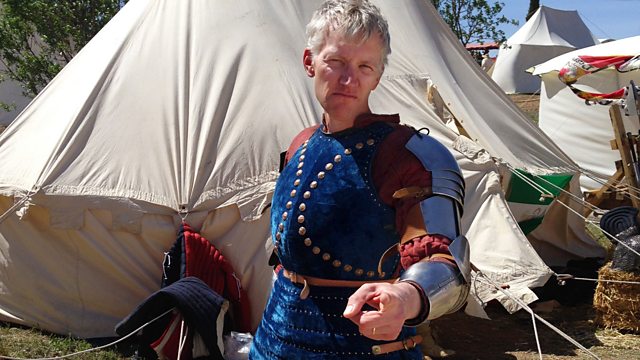03/09/2013
Listeners and historians join Tom Holland to discuss the latest research, and we criss-cross the country to learn about the many ways we can all connect with the past.
Tom Holland is joined in the Making History studio by Richard Partington from the University of Cambridge and, in Stirling, by Dr Fiona Watson from the University of Dundee.
With the 500th anniversary of the Scots defeat at Flodden just a few days away, Tom travels to Northumberland to meet Clive Hallam Baker who explains why James VI came a cropper after his invasion.
Back in the studio, journalist Alex Massie joins the discussion as we try and understand why this battle seems so little-remembered.
Another great battle is analysed in a new book by the medieval historian Richard Barber, but Helen Castor wonders whether its title, "Edward III and the Triumph of England" tells us more about the rise of the English nation in the 14th century than it does about military success on the continent.
Finally, Tom hears from Andrew Nicholl about a new project in Scotland which allows listeners to get their hands on over 400 years of history. Transcribe Scottish Places needs volunteers to type out documents that go back to 1645 and these will then become freely available on-line to users around the world.
Contact the programme: making.history@bbc.co.uk
Produced by Nick Patrick
A Pier production for Βι¶ΉΤΌΕΔ Radio 4.
Last on
Programme Guests
Flodden

On the 9th September 1513 a Scottish army led by King James IV was defeated by a smaller English army under the command of the Earl of Surrey at Flodden just south of the River Tweed in Northumberland. The Scots were 60,000 strong: well-trained and well armed. Surrey led a smaller force which had hurriedly moved north in the summer after his king, Henry VIII had gone to fight in France. James was trying to open up a second front to help his French allies. But, his move into England cost him his life.
Tom Holland went to Flodden to meet up with the battlefield historian Clive Hallam Baker to find out why James had attacked and how he managed to lose.
Μύ
.

Tom talks to journalist Alex Massie and asks why the battle of Flodden is not as well commemorated as the famous Scots victory at Bannockburn.
Edward III

Richard Barber is the author of a new book called "Edward III and the Triumph of England".
Μύ
Μύ
His focus is the English victory at the Battle of Crecy in 1346 but when Helen Castor met him on a boat on the River Deben in Suffolk she wondered whether Edward’s reign was also the moment when the idea of an England we would recognise today first takes hold.
Μύ
Transcribe Scotland's Places
Thousands of volunteers are being sought to help transcribe historic archives in the largest crowd-sourcing project of its kind in Scotland.
They're being asked to help transcribe the information on more than 150,000 pages of historic archives dating from 1645 to 1880, reading old handwriting, identifying local places and pinpointing people in Scotland’s history.
There are more than one million records, written in Scots, English and Gaelic that cover land taxation; taxes on clocks and watches, windows and farm horses and Ordnance Survey "name books" which formed the first official record of Scottish place names.
Over 50 talks and workshops will now be held across Scotland in the next 12 months, to get people involved and trained in using the innovative online system.
Μύ
The information uncovered by the volunteer history sleuths will help to increase knowledge and understanding about Scotland’s history. Their transcriptions will be added to a treasure trove of historical information on the ,Μύwhich brings together records from three of Scotland’s national archives:Μύ the Royal Commission on the Ancient and Historical Monuments of Scotland (RCAHMS), the National Records of Scotland (NRS) and the National Library of Scotland (NLS).
Broadcast
- Tue 3 Sep 2013 15:00Βι¶ΉΤΌΕΔ Radio 4 FM
Podcast
-
![]()
Making History
Popular history series where the past connects with the present.


